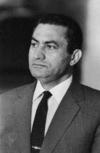- Mubārak, Ḥosnī
-
born May 4, 1928, Al-Minūfiyyah governorate, EgyptPresident of Egypt (from 1981).He attended a Soviet air academy and as air force commander (from 1972) planned Egypt's opening moves in the 1973 Arab-Israeli war. Named vice president in 1975, he became president on Anwar el-Sādāt's assassination in 1981. He maintained relations with Israel while working to restore Egypt to its traditional position as the most influential of the Arab states.
 Hosnī Mubārak, 1982.Barry Iverson/Gamma
Hosnī Mubārak, 1982.Barry Iverson/Gamma* * *
▪ president of Egyptborn May 4, 1928, Al-Minūfīyah governorate, Egyptpresident of Egypt from October 1981.Born in the Nile River delta, Mubārak graduated from the Egyptian military academy at Cairo (1949) and the air academy at Bilbays (1950), receiving advanced flight and bomber training in the Soviet Union. He held command positions in the Egyptian air force and from 1966 to 1969 was director of the air academy. In 1972 President Anwar el-Sādāt (Sādāt, Anwar el-) appointed Mubārak chief commander of the air force, and in this capacity he was credited with the successful performance of the Egyptian air force in the opening days of the war with Israel in October 1973. He was promoted to the rank of air marshal in 1974. In April 1975 Sādāt named him vice president, and in subsequent years Mubārak was active in most of the negotiations involving Middle Eastern and Arab policy. He served as the chief mediator in the dispute between Morocco, Algeria, and Mauritania over the future of Western (Spanish) Sahara.Mubārak became president following Sādāt's assassination on October 6, 1981, the anniversary of the start of the 1973 Egyptian-Israeli war. His years in office were marked by an improvement in Egypt's relations with the other Arab countries and by a cooling of relations with Israel, especially following the Israeli invasion of Lebanon in 1982. He reaffirmed Egypt's peace treaty with Israel (1979) under the Camp David Accords, however, and cultivated good relations with the United States, which remained Egypt's principal aid donor. In 1987 Mubārak was elected to a second six-year term as president. During the Persian Gulf crisis and war following Iraq's invasion of Kuwait in 1990–91, Mubārak led other Arab states in supporting the Saudi decision to invite the aid of a U.S.-led military coalition to recover Kuwait. He also played an important role in mediating the bilateral agreement between Israel and the Palestine Liberation Organization that was signed in 1993.Reelected president in 1993, Mubārak faced a rise in guerrilla violence and growing unrest among opposition parties, which pressed for democratic electoral reforms (the last free elections in Egypt had been held in 1950). He launched a campaign against Islamic fundamentalists, especially the Islamic Group, which was responsible for a 1997 attack at Luxor that left some 60 foreign tourists dead. In 1995 he escaped an assassination attempt in Ethiopia and in 1999 was slightly wounded after being attacked by a knife-wielding assailant. Throughout, Mubārak continued to press for peace in the Middle East. Running unopposed, he was reelected to a fourth term as president in 1999. In 2005 Mubārak easily won Egypt's first multicandidate presidential election, which was marred by low voter turnout and allegations of irregularities.* * *
Universalium. 2010.
